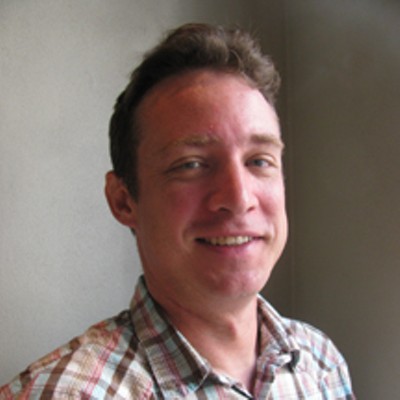And then there's the fact that although he's a proud native of Beaumont, it's hard to pin down where he's been living ever since. Like Larry McMurtry in the early '60s -- and McMurtry's no stranger to a love of travel himself -- Dayton's been on a Houston-Austin-L.A. shuttle pretty much nonstop for the past decade or so.
And now McMurtry and Dayton are united by something other than incurable wanderlust and soft spots for some of the same cities. Dayton has become a writer -- a playwright first, and almost immediately thereafter a screenwriter, as Balmorhea, the first play he had a hand in writing, was quickly optioned for film by a Hollywood production company.
This newest feather in Dayton's cap fell off the wing of a pretty fierce bird: his friend and Balmorhea co-writer Lew Temple's recent brush with death. Temple, whose credits include a recurring part on Walker: Texas Ranger and a role in the upcoming 21 Grams with Sean Penn and Benicio del Toro, survived a harrowing bout with leukemia about two years ago, and Balmorhea is loosely based on that battle.
Reached on the speakerphone at the Hollywood offices of rednaveL flmworx, the production company that has taken on Balmorhea, Temple says he was lucky to have been living in Houston at the time. Not only was M.D. Anderson here, but so was his support system.
Still, friends and family or no, a year at a cancer hospital will take your mind to some pretty strange places. "My random and elusive thoughts continued to take me to this magical place that Jesse and I had been: Balmorhea, Texas, an oasis in the desert," Temple says. "You know, I never had thought about movies, or big cities -- I just thought about the influence of Balmorhea, and when I got out of the hospital for rehab, Jesse said, 'Hey, let's write a story. We're storytellers. What do you want to write about?' And right away Balmorhea came together."
Temple had already been telling everybody who came near about Balmorhea for a long time. He was hipped to the place by an old fellow he met in Fort Worth's Stockyards one wild night in his younger days.
"I don't mind to tell you that I was loud and drunk that night, and an old cowboy was sitting next to me, and he said, 'Hey, Slick, where you goin'?' And I told him California. And he said, 'Well, I can tell you're drivin', 'cause I can see that you can't afford to fly.' And I said yessir. And he said, 'Well, do yourself a favor. Just this side of El Paso you pull off at Balmorhea, Texas. You pull off there, take your boots off, roll your pants legs up and dip your feet in the cold, cool water and that'll perk you up and get you on out west where you'll be able to catch the sun.' And I did that, and it was just like he said, and I've told everyone the same story. I should be on the Balmorhea Chamber of Commerce, 'cause I've told so many people to stop there and do that."
Back in the 1910s and '20s, sick people used to ride trains to Balmorhea to take the curative waters in the desert town. Stumbling through the Sahara that was his fight against leukemia, is it any wonder that Temple would remember that place where he got the energy to catch the sun?
"Lew almost died," Dayton says from his South Austin home. "He had lost his kidneys, he lost his liver, and he came back miraculously, and when he got out of the hospital we went on a road trip and we wrote this play called Balmorhea about this dysfunctional West Texas ranch family."
That's right, they wrote the thing on the road. "We started writing it in L.A., and we went through Arizona, New Mexico, Texas and into Louisiana, and by the time we got to New Orleans we'd finished it," Dayton says. "We wrote it all freehand in the car."
"We wrote it on Burger King paper bags and notepads, and later putting it all together was like doing a jigsaw puzzle," remembers Temple. "Somehow we pieced it all together to what's now a blueprint to a really heartfelt screenplay."




